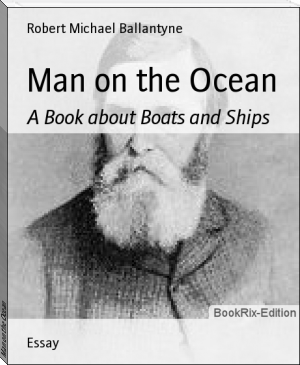Man on the Ocean - Robert Michael Ballantyne (mini ebook reader txt) 📗

- Author: Robert Michael Ballantyne
Book online «Man on the Ocean - Robert Michael Ballantyne (mini ebook reader txt) 📗». Author Robert Michael Ballantyne
The sentry at once challenged, when Lieutenant Doubarsoff, the commander of the _Czarevich_, answered "Friends." But his speech betrayed him; the alarm was spread; and the _Hifse Rahman_ opened a sharp fire upon the launches. But Lieutenant Doubarsoff succeeded in attaching his torpedo-chain to a rope hanging at the monitor's bows, and then rapidly backed his little vessel and fired the torpedo. A tremendous explosion; a column of water shot up into the air, and the launch was nearly swamped! A breach had, however, been made in the _Hifse Rahman's_ bulwarks.
The other monitors were now thoroughly alive to their danger, and the Russian launches had to sustain a deadly cannonade, upon which Lieutenant Doubarsoff ordered Lieutenant Schestakoff to bring up his launch, the _Xenia_, and apply a second torpedo, which the latter was able to do, attaching the missile amidships of the Turkish vessel. The fate of the _Hifse Rahman_ was now sealed, and in a few minutes she sank.
The Russian launches succeeded in getting clear of their enemy again without losing a single man, and thus ended the first torpedo expedition ever made against an enemy's ironclads, but which may, as a writer describing the event says, "end in completely revolutionising our present system of monster iron walls." The Grand Cross of Saint George was awarded to Lieutenants Doubarsoff and Schestakoff for this intrepid and successful exploit.
Space is not left us to do more than revert for a moment to what is perhaps the deadliest weapon of offensive naval warfare yet devised,-- rams. Some experts maintain that nothing can match the power of the ram of a modern ironclad skilfully handled; and a well-known naval authority has declared that the use of the guns in a naval action should be merely preliminary to that of the ram--in other words, that all effort should be concentrated upon making an opportunity of using the ram.
We close this chapter by recalling the reader's attention to a feature in modern war-ships already alluded to, and which indeed the whole course of our remarks upon this subject points to--the almost universal use of machinery in modern naval tactics. Most assuredly in modern sea-warfare it may be said, in the Laureate's words--used by him, of course, with a very different sense--that "the individual dwindles," so that the prediction, which some of our readers may remember was once made by a First Lord of the Admiralty, seems not unlikely one day to become sober fact--that the time will come when we shall no longer require sailors, because all that our warships will need will be stokers and artillerymen. Whether this is a consummation to be desired we are not careful here to pronounce.
CHAPTER THIRTEEN.
ORIGINS OF STEAMSHIPS--OCEAN-STEAMERS, ETCETERA.
As we have been led, in writing about ships of the navy, to refer to steam, we turn aside at this point to treat of that tremendous motive-power.
One night, in the year 1807, a terrible sight was witnessed by the inhabitants of the banks of the river Hudson in America.
Men love what is marvellous, and they will go a long distance out of their way to see that which is terrific and horrible; but on the night in question there was no need to go far. The farmers had only to look out of their windows, and the sailors of the shipping had only to lift their heads above the bulwarks, to behold a sight that appalled the stoutest hearted, and caused the very hair on the craniums of the timid to stand on end.
The object that created so much consternation was--a "monster of the deep!" At some parts of the river, men could not tell what it was like, for the night was dark when it passed, but a dark, shadowy idea they obtained by the light of the fire which the creature vomited from its jaws; and they formed a tremendous conception of its size and power from the speed at which it travelled, the splashing which it made, and the hideous groans with which it burdened the night-air.
This "fiery monster of the deep" was the _first_ river-steamer, the _Clermont_!
Before going further into the details of this the first of a class of ships which have, within the last fifty years, almost completely changed the whole system of navigation, let us take a cursory glance at the first attempts made to propel ships by means of steam.
The subject has occupied mankind much longer than many people suppose. So long ago as the year 1543, a naval captain of Spain applied an engine to a ship of about two hundred tons, and succeeded in moving it at the rate of about two miles an hour. The nature of his engine the captain kept secret; but it was noted that part of it consisted of a caldron of boiling water.
This we are told by Thomas Gonzales, the director of the Royal Archives of Simancas; but his veracity is now called in question,--at any rate, nothing further was afterwards heard of the discovery.
The first authentic record we have of steam navigation occurs in a work written by the Marquis of Worcester in 1665, in which allusion is made to the application of engines to boats and ships, which would "draw them up rivers against the stream, and, if need be, pass London Bridge against the current, at low-water."
Many attempts, more or less successful, were made by ingenious men from time to time. Papin of France in 1690 constructed a steamboat, the success of which may be gathered from the fact that it was ultimately broken up by enraged and jealous watermen! Jonathan Hulls in 1736, and M. Genevois in 1759, were each successful, to a certain extent, in constructing working models, but nothing definite resulted from their labours. Yet we would not be understood to undervalue the achievements of such men. On the contrary, it is by the successive discoveries of such inquiring and philosophical men that grand results are at last attained. The magnificent structures that crowd the ocean were not the creations of one era, or the product of one stupendous mind. They are the result of the labours of thousands of men whose names have never been known to fame.
The men who, working upon the materials supplied by preceding generations, brought the propulsion of boats by steam nearest to perfection, _just before_ the commencement of navigation, were Mr Miller of Dumfries, Mr Taylor, his friend, and tutor in his family, and Mr Symington. All of these were, in a very important degree, instrumental in ushering in the great event. Symington, in 1788, fitted an engine to a large boat, in which he attained the speed of seven miles an hour.
The man to whom the credit belongs of introducing _steam navigation_ is undoubtedly Mr Fulton of America. This gentleman, who was contemporary with those just mentioned, visited France and England, in the former of which countries he endeavoured, unsuccessfully, to carry out his projects, while in the latter he met with Symington, and obtained much valuable information from him.
We have no sympathy whatever with those who seem to rake in to the credit of their own country every discovery and invention they possibly or plausibly can. We did much _towards_ the commencement of steam navigation, but we did not begin it. We pushed considerably in advance of other nations in the invention of apparatus by which boats might be propelled by steam; we constructed models, tried it on a small scale, and found the thing to answer admirably: but we rested there. Meanwhile, an enterprising American came and saw our achievements, ordered an engine in England, carried it across the Atlantic, and _commenced_ the era of steam navigation, on the river Hudson, by building and launching:
THE FIRST STEAMER.
Robert Fulton, in conjunction with Chancellor Livingston of America, planned, built, and launched a boat in the spring of 1807, which they named the _Clermont_. It was propelled by steam, and averaged the rate of five miles an hour on its first voyage from New York to Albany, a distance of nearly one hundred and fifty miles.
All discoveries and novelties, great and small, are treated with ridicule at first by the mass of mankind, so it is not a matter of wonder that the crowds which flocked to the wharf to see the _Clermont_ start on her first trip were somewhat satirical and jocose in their remarks. But when the steam was turned on, and they heard the first of that series of snorts that was destined ere long to shake the trembling air of land and sea, and saw the great, uncouth paddle-wheels revolve powerfully in the water and churn it into foam, a shout, tinged doubtless with prophetic fervour, greeted the triumphant engineer as his little steamboat darted from the shore.
Colden, in his Life of Fulton, speaks thus of the _Clermont's_ first voyage:--
"She excited the astonishment of the inhabitants of the shores of the Hudson, many of whom had not heard even of an engine, much less of a steamboat. There were many descriptions of the effects of her first appearance upon the people of the banks of the river.
"Some of these were ridiculous, but some of them were of such a character as nothing but an object of real grandeur could have excited. She was described by some, who had indistinctly seen her passing in the night, as a monster moving on the waters, defying the winds and tide and breathing flames and smoke! She had the most terrific appearance from other vessels which were navigating the river when she was making her passage. The first steamboat (as others yet do) used dry pine wood for fuel, which sends forth a column of ignited vapour many feet above the flue, and, whenever the fire is stirred, a galaxy of sparks fly off, which, in the night, have a very brilliant and beautiful appearance.
"This uncommon light first attracted the attention of the crews of other vessels. Notwithstanding the wind and tide, which were adverse to its approach, they saw with astonishment that it was rapidly coming towards them; and when it came so near that the noise of the machinery and paddles was heard, the crews--if what was said in the newspapers of the time be true--in some instances shrank beneath their decks from the terrific sight, and left their vessels to go on shore; whilst others prostrated themselves, and besought Providence to protect them from the approaches of the horrible monster which was marching on the tide, and lighting its path by the fires that it vomited!" The _Clermont_ became a regular passenger boat on the Hudson; and the progress of steam navigation continued to advance, until nearly all the navigable rivers of the world, and the great ocean itself, were covered with these clanking ships of commerce, which have added more to the comfort, the wealth, and the power of man--the power of doing good as well as evil-- than the feeble human mind can conceive.
THE COMET.
It was not until five years after the Americans set us the example that we





Comments (0)